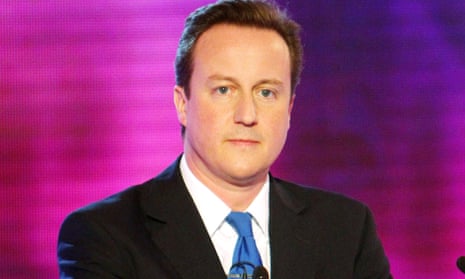Broadcasters are expected to press ahead with the planned televised general election debates, despite David Cameron saying he will only appear in one of them.
The BBC, Channel 4, ITV and Sky are discussing the latest offer from No 10 and thinking carefully about its implications.
Sources say they are bound by impartiality rules but are determined that no one party will dictate the grounds.
One source said that the current thinking among the broadcasters is that they “will hold the debates” and if specific people do not want to turn up then that will be their decision.
There had also been suggestions that all the broadcasters could work together to co-produce one debate.
In theory, Ofcom’s guidelines allow the networks to “empty chair” Cameron as long as they provide “due impartiality”.
Under the rules this could be achieved by having someone acting as a representative – such as a political journalist – who would effectively balance the broadcast by giving the views of the missing party.
That is a particular issue for Channel 4 and Sky as they are due to air the head-to-head between Miliband and Cameron on 30 April.
Ofcom’s rules say: “The concept of giving ‘due weight’ to the major parties, as required by rule 6.2, is flexible. Its application depends on the electoral context.
“Rule 6.2 does not mean that broadcasters automatically have to accord more coverage to the major parties, compared with other parties and independent candidates with ‘significant views and perspectives’.
The proposed itinerary for the debates from the broadcasters is:
2 April: ITV – Debate between the party leaders of the Conservatives, Labour, Liberal Democrats, Ukip, the SNP, the Green party and Plaid Cymru
16 April: BBC – Debate between the party leaders of the Conservatives, Labour, Liberal Democrats, Ukip, the SNP, the Green party and Plaid Cymru
30 April: Sky and Channel 4 – Head-to-head debate between the leader of the Conservative party and the leader of the Labour party
Dr Matthew Ashton, a lecturer in politics at Nottingham Trent University, said: “The handling of the TV debates has been a perfect lesson in how not to manage the media. Cameron’s inability to commit, along with his constant shifting of the goalposts has just served to alienate the major broadcasters and exasperate the public.
“Cameron would have been better advised to have refused the idea of debates either late last year, or in early 2015. While this would have run the risk of having him followed everywhere for a couple of weeks by a giant chicken, it might have been better in the short term than this torturous process of demand and counter-demand.
Ashton added: “He’s also been haunted by his statements from 2010 about the importance of debates to the democratic process. Nothing significant has changed between then and now apart from the fact that he perceived the debates to be electorally advantageous to him then, but not now. What he really seems to fear is some new version of Cleggmania (Mili-mania) where Miliband reveals hitherto unexpected reserves of charisma and verbal dexterity.”
Meanwhile, negotiations are still continuing with the parties following the Guardian’s joint bid with YouTube and the Telegraph to hold a 2015 party leaders’ debate online.

Comments (…)
Sign in or create your Guardian account to join the discussion